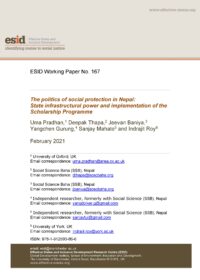Publications
The Politics of Social Protection in Nepal: State Infrastructural Power and Implementation of the Scholarship Programme
This paper explores the dynamics shaping the implementation of Nepal’s School Scholarship Programme, an educational assistance programme that provides cash stipends to primary and secondary students of marginalised communities. Drawing on fieldwork in four districts – Ilam, Saptari, Lalitpur and Jumla – this paper makes two distinct arguments. First, it highlights the importance of infrastructural power to the implementation of social transfers – especially the limited capacity of higher levels of the state to monitor effectively the actions of lower levels. Second, it concludes that programme design can compensate for some of the limitations of state infrastructural power – especially the use of categorical targeting to distribute scholarships that has emerged from social justice framing of the scholarship programme. The limitations of state infrastructural power are especially keenly felt with respect to the disbursement of scholarships. As such, limited state infrastructural power leads to delayed and reduced payments that are likely to undermine the potential of the programme to effect social justice.

